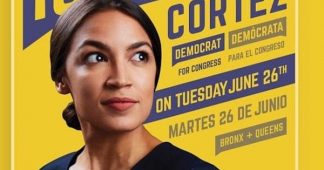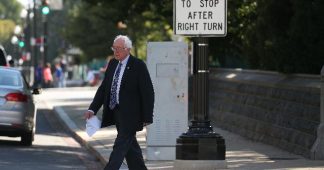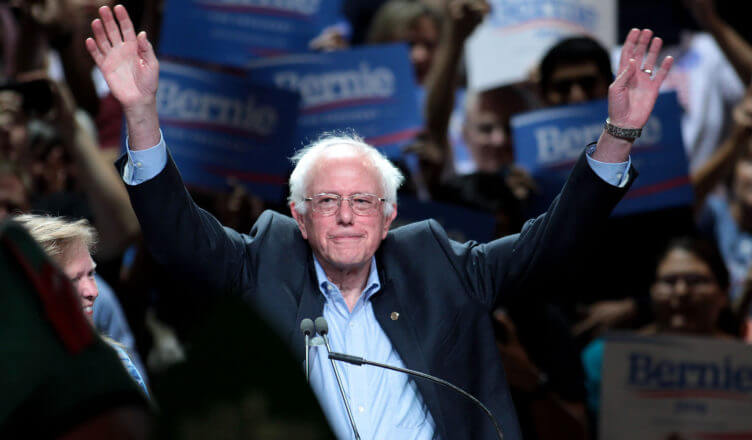By Dave Lindorff
20 Jul, 2018
Since its heyday in the early 20th Century, socialism in the US struggled to win even a tiny following. Now candidates are openly calling themselves socialists and winning elections.
Philadelphia – Last month, a major earthquake shook the bedrock of New York City politics, sending shockwaves that were felt across the US as 28-year-old Brooklyn-born Puerto Rican socialist Alexandria Ocasio-Cortez trounced Rep. Joe Crowley, a 10-term House of Representatives member who was widely presumed to be the likely successor to long time House leader Nancy Pelosi.
A socialist winning an important House race in a country that just elected billionaire capitalist Donald Trump as president, and handed control of both houses of Congress to the Republicans – a party dedicated to unfettered capitalism? How can this be?
Clearly, some kind of tectonic shift is underway in American politics, because Ocasio-Cortez is not the only socialist winning elections and ousting establishment Democrats. Four incumbent members of the state legislature in Pennsylvania, a state that narrowly voted for Trump in 2016, were defeated this year in primaries by insurgent candidates – all of them, like Osario-Cortez, members of Democratic Socialists of America, a little-known political group that has suddenly grown in membership from 6000 prior to 2016 to over 40,000 this year.
And as if that weren’t enough, in a stunning aftershock following her initial win in Brooklyn, Ocasio-Cortez learned that she had won a primary in a neighboring district in the Bronx on the Reform Party line. That minor party had no candidates running and had urged voters in the district to write in Osario-Cortez’s name, which they did in large numbers.
Socialism as a political force has never had an easy time in the US, a country that mythologizes the go-it-alone entrepreneur and the iconoclastic loner. For a brief time in the period between the two world wars, socialism was popular enough among US workers that American Socialist Party leader Eugene Debs was able to win almost a million votes for president in 1912 (about 6 percent of the popular vote at that time). But after two brutal government anti-red campaigns in the ‘20s and ‘50s that included Debs’ arrest, the blacklisting of many actors, teachers and journalists in the 1950s on charges of being Communists, and finally decades of government and media propaganda equating socialism with Communism, Bolshevism and Maoism, socialism has had few adherents and little public acceptance among most Americans.
Until now, that is.
Things started to change in late 2015 and the spring of 2016 when the independent US Senator Bernie Sanders, who has long called himself a “democratic socialist,” surprised everyone by running a popular grass-roots primary campaign that nearly defeated Hillary Clinton for the Democratic Party’s presidential nomination. (Many believe hidden favoritism and sabotage by the leadership of the Democratic Party may have stolen that primary from Sanders.)
Now, in part because the Sanders campaign has made socialist ideas like national healthcare and free college education – once not on any Democratic candidate’s campaign agenda – suddenly acceptable topics for political discourse, his millions of enthusiastic youthful supporters from that campaign are openly considering socialism as a possible answer to the economic problems they face.
And as those young people, and older folks too, look for answers, more and more candidates are willing to espouse them. And like Ocasio-Cortez and the four socialists who won primaries in Pennsylvania, they are showing that proposing or supporting socialist programs, and even calling oneself a socialist, can be a winning strategy.
One sign that this sudden popularity of socialist politics and ideas is not just a short-time phenomenon is that it’s showing up most among younger people, many of whom hadn’t shown much interest in politics before. A Harvard University study published in April for example, found that 51 percent of those between the ages of 18-29 disliked capitalism, with a majority preferring socialism as a political system. A year earlier, the conservative magazine National Review wrote with alarm that in the wake of the Sanders campaign, a poll by the conservative American Culture and Faith Institute had found 40 percent of Americans saying they favored socialism over capitalism.
Add to that the huge and growing older population of retirees living on Social Security retirement benefits (which Republicans and conservative Democrats keep warning need to be reduced), and already dependent on a kind of socialized medicine called Medicare which is inadequate but still wildly popular and only available to those over the age of 65. These people already know the value of at least two socialist-style programs. Meanwhile many Baby Boomers, who came of age during the ‘60s and ‘70s, a period of rejecting capitalist consumerism and of experimenting with communal living, are considering returning to their “socialist” roots, re-establishing communes as a away of reducing living costs and avoiding being moved into nursing homes as they age.
One person who sees a new receptivity among Americans for socialist ideas and candidates is Kevin Zeese, a long-time activist and occasional candidate for the Green Party – a small environmentalist/socialist party that has been running candidates locally and nationally for years, including in presidential races. He tells RT, “Yes, socialism is getting more popular. It is an economic approach that is kept out of schools and not fairly discussed in the media, so when someone says they support socialism – what do they mean? I suspect there are lots of different types of answers.”
But he adds, “Putting aside those details, people are experiencing the unfairness of capitalism. When half the US population literally has wealth equal to three people, there is something seriously wrong, especially when that half of the population is economically insecure, tens of millions in poverty, and many not having enough income to rent a decent house, not to mention buy one. Capitalism is not working for most people and they want an alternative.”
Zeese cautions against reading too much into the recent primary victories by socialist candidates like Ocasio-Cortez and others across the country in state and local races, noting that voter turnout in primary races, as opposed to general elections, is always fairly small, and that in any case, each local race or congressional race has many local factors and issues. For example, he points out that Ocasio-Cortez, a Latina, ran in a district that is primarily Latin American, including many voters who are Puerto Ricans like herself.
But having made that caveat, he goes on to say her primary victory and the likelihood that she will win of a seat in Congress in November gives her “a very important role in educating people on the issues, as she now has a big megaphone. More people will learn from her and the socialist movement will develop.”
* Dave Lindorff is an award-winning US journalist, former Asia correspondent for Business Week, and founder of the collectively-owned journalists’ news site ThisCantBeHappening.net.
Published at https://www.rt.com/op-ed/433821-socialism-us-sanders-ocasio-cortez/











